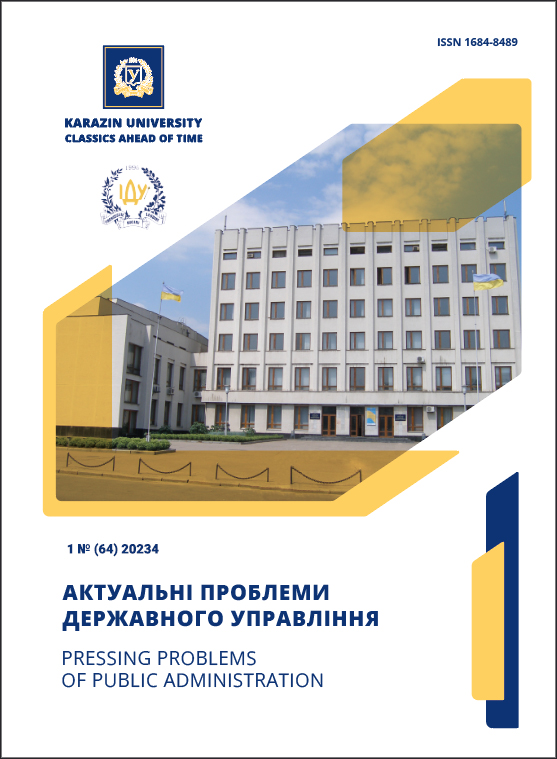Theoretical and Applied Aspects of Ensuring Financial Inclusion as an Integral Component of Banking Sector Reformation
Abstract
This paper addresses the issue of ensuring financial inclusion as a component of banking sector reform. The aim of the study is to provide a theoretical justification for the growing role of financial inclusion in the context of banking sector reform and to develop relevant recommendations for improving regulatory policy regarding banking sector reform in Ukraine. This necessitated the formulation and resolution of four research objectives: examining the essence and components of financial inclusion; analyzing the current state of banking services accessibility in Ukraine; identifying the main problems and obstacles to the inclusivity of banking services; developing proposals to increase the level of banking services inclusivity.
The paper systematizes scientific approaches to the definition of «financial inclusion» and proposes its own interpretation in the context of the banking sector. Statistical data on the level of banking services accessibility in Ukraine during the pre-war period and under the legal regime of martial law are examined. The main problems and obstacles to the inclusivity of banking services are identified, and tools and strategies for developing financial inclusion in the course of banking sector reform are proposed. The conclusion is drawn that financial inclusion in Ukraine demonstrates positive dynamics, but requires further efforts to fully bridge the gap in access to financial services and ensure equal conditions for all segments of the population.
The article makes a key conclusion that the introduction of digital financial education and expanding access to financial services in remote areas are crucial steps to increase financial inclusion in Ukraine. These measures will not only enhance financial literacy and access to financial services but also create a solid foundation for the country’s sustainable economic development in the future. Both proposals are aimed at utilizing technological innovations to overcome existing barriers to financial inclusion, taking into account Ukraine’s specific conditions. Their implementation will require close cooperation between the government, the National Bank of Ukraine, the financial sector, and technology companies, but the potential benefits for the economy and society are significant.
Downloads
References
Akimova, O.V. (2015). Financial inclusion and other prerequisites for the development of financial monitoring in Ukraine. Young Scientist: Scientific Journal, 12(27), 198–204. [in Ukrainian].
Bobukh, I.N., & Shchehel, S.M. (2018). Strategic guidelines for economic growth in Ukraine. Inclusiveness as a key priority. Bulletin of the National Academy of Sciences of Ukraine, 7, 55–70. [in Ukrainian].
Rebuilding Ukraine: Principles and Policies (Y. Gorodnichenko, I. Sologub, B. Weder di Mauro, Eds.). (2022). URL: https://cepr.org/system/files/2022-12/reconstruction%20book_Ukrainian_0.pdf [in Ukrainian].
Zakharchenko, N.V. (2020). Financial inclusion to improve the welfare of the population and economic growth of the state. Finance of Ukraine, 6, 105–116. [in Ukrainian].
Report on the direct damage to infrastructure from destruction due to Russia’s military aggression against Ukraine a year after the full-scale invasion. (2022). URL: https://kse.ua/wp-content/uploads/2023/03/UKR_Feb23_FINAL_Damages-Report-1.pdf [in Ukrainian].
Report on financial stability December 2022. (2022). URL: https://bank.gov.ua/admin_uploads/article/FSR_2022-H2.pdf?v=4=4 [in Ukrainian].
Kovalenko, M.M., & Dunayev, I.V. (2023). Components of public policy in the conditions of implementing the mobilization model of economic development. Theory and Practice of Public Administration, 1(76), 7–25. https://doi.org/10.26565/1727-6667-2023-1-01 [in Ukrainian].
Kud, A.A. (2023). The global problem of increasing economic inequality and the tokenization of assets as a prospect for its resolution. Economic Analysis, 33(2), 7–24. DOI: https://doi.org/10.35774/econa2023.02.007 [in Ukrainian].
Naumenkova, S.V. (2014). Financial inclusion and problems of ensuring access to basic financial services in Ukraine. Bulletin of the National Bank of Ukraine, (11), 31–37. URL: http://nbuv.gov.ua/UJRN/Vnbu_2014_11_15 [in Ukrainian].
Orel, Y.L., & Kulinych, O.V. (2023). The impact of business deregulation on the post-war recovery of Ukraine’s economy: public administration aspect. Scientific Notes of Vernadsky Taurida National University. Series: Public Administration and Administration, 34(73)(6), 32–39. DOI: https://doi.org/10.32782/TNU-2663-6468/2023.6/06 [in Ukrainian].
National Bank of Ukraine. (2020). On the approval of the regulation on the implementation of financial monitoring by banks: Resolution of the National Bank of Ukraine No. 65 dated 19.05.2020 (as of 17 June 2023). URL: https://zakon.rada.gov.ua/laws/show/v0065500-20#Text [in Ukrainian].
Ministry of Finance of Ukraine. (2020). Financial Sector Strategy of Ukraine until 2025. URL: http://surl.li/gprgpx [in Ukrainian].
National Bank of Ukraine. (2021). Financial literacy, financial inclusion and financial well-being in Ukraine in 2021. URL: http://surl.li/ftycuy [in Ukrainian].
National Bank of Ukraine. (n.d.). Financial inclusion for economic growth: results of the international ‘Financial Inclusion Forum. Nobody Overboard’. URL: http://surl.li/jfysry [in Ukrainian].
Anyangwe, T., Vanroose, A., & Fanta, A. (2022). Determinants of financial inclusion: Does culture matter? Cogent Economics & Finance, 10(1). DOI: https://doi.org/10.1080/23322039.2022.2073656
Banerjee, A.V., & Duflo, E. (2007). The economic lives of the poor. Journal of Economic Perspective, 21(1), 141–167. DOI: https://doi.org/10.1257/jep.21.1.141
Camara, N., Pena, X., & Tuesta, D. (2014). Factors that matter for financial inclusion: Evidence from Peru. Working Papers 1409, BBVA Bank, Economic Research Department.
Dabla-Norris, E., Ji, Y., & Townsend, R. (2015). Identifying constraints to financial inclusion and their impact on GDP and inequality: a structural framework for policy. Working Papers. WP/15/22. New York: International Monetary Fund.
Dunayev, I., Kuchma, M., Byelova, L., Jatkiewicz, P., Bilichenko, O., & Poberezhets, H. (2024). Wartime destruction: regional assessment of damage to Ukraine’s infrastructure. International Journal of Environmental Studies. DOI: https://doi.org/10.1080/00207233.2024.2314862
Hogan, J.L. (2024). Why does community ownership foster greater acceptance of renewable projects? Investigating energy justice explanations. Local Environment, 1–23. DOI : https://doi.org/10.1080/13549839.2024.2360716
Kling, G., Pesqué-Cela, V., Tian, L., & Luo, D. (2020). A theory of financial inclusion and income inequality. The European Journal of Finance, 28(1), 137–157. DOI: https://doi.org/10.1080/1351847X.2020.1792960
Koudalo, Y., & Toure, M. (2023). Does financial inclusion promote financial stability? Evidence from Africa. Cogent Economics & Finance, 11(2). DOI: https://doi.org/10.1080/23322039.2023.2225327
Ozili, P.K. (2020). Financial inclusion research around the world: A review. Forum for Social Economics, 50(4), 457–479. DOI: https://doi.org/10.1080/07360932.2020.1715238
Tissot, B., & Gadanecz, B. (2018). Measures of financial inclusion - a central bank perspective. The role of data in supporting financial inclusion policy. 47th ed. Marrakech, Morocco, 24.
World Bank. (2020). How Countries Can Expand Access to Digital Financial Services. Washington: World Bank. URL: http://surl.li/flxssq

